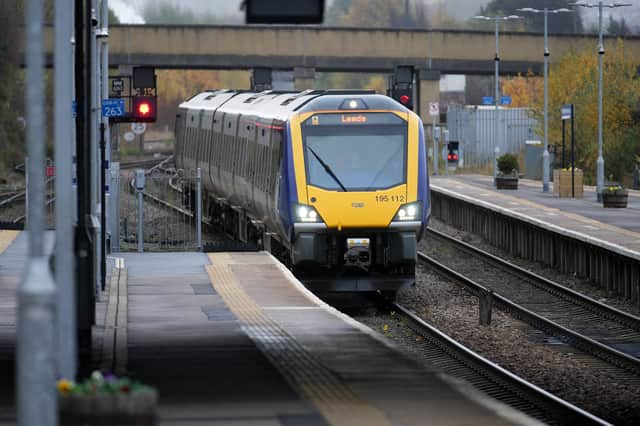Commuters hit by biggest increase in train ticket prices since 2013


On Tuesday 1 March the cap on fare rises will increase meaning ticket prices could go up by as much as 3.8%.
Advertisement
Hide AdAdvertisement
Hide AdThe rail fare increase is based on last July’s Retail Prices Index (RPI) inflation rate, and comes at a time when the UK’s cost of living is rising at the fastest pace for 30 years.
How much will ticket prices increase?
Regulated fares in England and Wales will rise by up to 3.8%.
They cover around half of fares and include season tickets on most commuter routes.
An annual season ticket between Brighton and London will go up by £194 to £5,302.
Advertisement
Hide AdAdvertisement
Hide AdA year-round ticket between Liverpool and Manchester will also go up by £105 to £2,865.
Season ticket fare rises are regulated by UK, Scottish and Welsh governments on most commuter routes.
Before the COVID pandemic, most other fares were controlled by train operators, but these have now come under state control following billions of pounds being pumped into the industry to keep it going.
Why are the prices increasing?
The rise is based on the rate of retail price inflation in July.
Advertisement
Hide AdAdvertisement
Hide AdA Department for Transport spokesman said: "We have protected passengers by delaying these fare rises by two months and, even then, opting for a figure well below current inflation rates.
"However, we must now look to recoup some of the £14 billion which was spent to keep vital services running throughout the pandemic in a way that is fair for all taxpayers.”
The rise comes despite the rail industry struggling - train demand is still around a third below what it was before the pandemic lockdowns.
But the Department of Transport said that despite the rail fare increase “we will be able to encourage people back on to trains whilst funding the necessary improvements and unprecedented investment that will benefit all those who use our railways."
Advertisement
Hide AdAdvertisement
Hide AdAn RDG spokesman said: "The government’s decision to hold fares down below current inflation is positive.
"It is important that fares are set at a level that will encourage more people to travel by train in the future, helping to support a clean and fair recovery from the pandemic."
Train operators are working to restore their services back to full capacity, after many were cut due to staffing shortages associated with the new strain Omicron.
What has the criticism been?
The Government has been accused of adding to the cost of living crisis following the largest rise in rail fares
Advertisement
Hide AdAdvertisement
Hide AdLabour’s shadow transport secretary Louise Haigh said: "This brutal Tory fare hike will be a nightmare for millions of passengers.
"Families are already facing tax rises and surging bills, and will now be clobbered with yet another eye-watering rise in the cost of the commute."
Railfuture has accused the government of "stoking the fires of the cost of living crisis", calling the rises to fares "eye-watering".
Bruce Williamson from the campaign group asked "how does this help get the country back to work?".
Advertisement
Hide AdAdvertisement
Hide AdHe claimed passengers will be "bankrupted next year" if fares continue to be set in conjunction with the rise of inflation.
What about ticket prices in Scotland and Northern Ireland?
A similar increase of 3.8% was implemented in Scotland on 24 January.
While train fares in Northern Ireland are set by state-owned operator Translink, which does not use RPI.
A version of this article originally appeared on NationalWorld.com